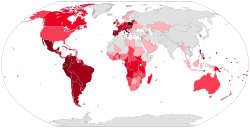Catholic Church in Kosovo
| Part of a series on the |
| Catholic Church by country |
|---|
 |
|
|

The Catholic Church has a population in Kosovo[a] of approximately 65,000 in a region of roughly 2 million people. Another 60,000 Kosovar Catholics are outside the region, mainly for work.[1] They are mainly ethnic Albanians, with a few Croats.
The Diocese of Prizren-Priština (until 5 September 2018, an Apostolic Administration of Prizren) is the ecclesiastical district of the Catholic Church in Kosovo. It is centered in the city of Prizren. Bishop Dodë Gjergji serves as diocesan bishop as of 2019. As of 2019, the Holy See does not recognise Kosovo as a sovereign state (see also Holy See's reaction to the 2008 Kosovo declaration of independence).
Papal nuncio[]
Archbishop Juliusz Janusz, 66, originally a priest of the Archdiocese of Kraków, Poland, is the Apostolic Nuncio to Slovenia and the Apostolic Delegate to Kosovo; he had served previously as Apostolic Nuncio to Hungary and before that as Apostolic Nuncio to Mozambique and Rwanda. He was delegate from 10 February 2011 to 21 September 2018.
Titular archbishop of Sulci Jean-Marie Speich is Apostolic Nuncio to Slovenia and Apostolic Delegate to Kosovo from 19 March 2019.
History[]
Kosovo conflict (1998-1999)[]
During the Kosovo war, vandalisation of Kosovo Albanian Catholic churches occurred.[2] The Catholic Church of St Anthony located in Gjakovë had major damage done by Yugoslav Serb soldiers.[3] In Pristina, Yugoslav Serb officers ejected nuns and a priest from the Catholic church of St. Anthony and installed aircraft radar in the steeple.[2]
Modern period[]
On 26 November 2019, an earthquake struck Albania. The Catholic Church in Kosovo held mass on 1 December across the country and it collected charitable donations by parishioners for earthquake victims and their families.[4][5]
One of the oldest Catholic churches in Kosovo is the Catholic church of Vinarc, in Mitrovica.[6][7]
Churches[]

Cathedral of Saint Mother Teresa
Church of Letnica
Interior
Church of Stublla
Interior

Church ceiling of Morava e Binçës.

Stained glass depiction of Catholicism and Catholic life in Kosovo, Cathedral of Saint Mother Teresa in Pristina
See also[]
- Religion in Kosovo
- Christianity in Kosovo
- Serbian Orthodox Church in Kosovo
- Protestantism in Kosovo
- Kosovo Protestant Evangelical Church (KPEC)
- Laramans, historical community of crypto-Catholics
Notes[]
| a. | ^ Kosovo is the subject of a territorial dispute between the Republic of Kosovo and the Republic of Serbia. The Republic of Kosovo unilaterally declared independence on 17 February 2008. Serbia continues to claim it as part of its own sovereign territory. The two governments began to normalise relations in 2013, as part of the 2013 Brussels Agreement. Kosovo is currently recognized as an independent state by 97 out of the 193 United Nations member states. In total, 113 UN member states are said to have recognized Kosovo at some point, of which 15 later withdrew their recognition. |
References[]
- ^ "In Kosovo, whole families return to Catholic faith" Archived 2009-02-11 at the Library of Congress Web Archives catholicnews.com 9 February 2009 Link accessed 21 March 2010
- ^ Jump up to: a b Schwartz, Stephen (2000). Kosovo: Background to a War. London: Anthem Press. p. 161. ISBN 9781898855569.Schwartz 2000, p. 161. " Albanian Catholic churches were also vandalized. Riedlmayer learned that Serb officers had installed anti-aircraft radar in the steeple of St. Anthony's Catholic church in Pristina, after ejecting the priest and nuns; NATO bombing of the radar, and therefore the church and surrounding houses, would have been labelled an atrocity."
- ^ Bevan, Robert (2007). The Destruction of Memory: Architecture at War. Reaktion books. p. 85. ISBN 9781861896384. "Major damage to the Roman Catholic church of St Anthony in Gjakova, reportedly bombed by NATO, was actually committed by Serbian soldiers."
- ^ "Kisha Katolike në Kosovë organizon meshë dhe mbledhje të hollash për të prekurit e tërmetit në Shqipëri" (in Albanian). Epoka e Re. 27 November 2019. Retrieved 29 November 2019.
- ^ "Kisha Katolike e Kosovës kujton viktimat e tërmetit në Shqipëri". Vatican News. 2 December 2019. Retrieved 2 December 2019.
- ^ https://dtk.rks-gov.net/tkk_objekti_en.aspx?id=1697
- ^ http://mitrovicaguide.com/place/catholic-church-of-vinarc/
- Catholic Church in Kosovo
- Catholic Church by country






